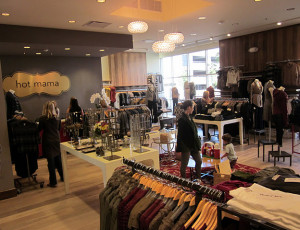As the holiday season begins, retail stores vamp up to sell merchandise to crowds of shoppers, but also to stop shoplifting. Retailer, Hot Mama, is in hot water for its particularly aggressive anti-theft policy, which has employees racially profiling customers according to the ACLU of Colorado.
Hot Mama is a large nationwide retailer, selling women’s clothing in over 40 stores and online. Their anti-theft policy tells employees to identify a potential shoplifter if “a customer that doesn’t look like the typical Hot Mama shopper.” Once identified, the employee should “stick to potential thieves by following them everywhere in the store. Make them feel uncomfortable. Ask questions.” The policy warns that,
“Shoplifters will try to make YOU feel uncomfortable. They may say: ‘Are you following me because of my race?’ Please respond: ‘We like to give each customer one-on-one service.’ Don’t worry about making them uncomfortable. That is your goal in this situation. The more uncomfortable they become, the quicker they leave…forever.”
The ACLU of Colorado finds the language of the policy laden with “subtle and not-so-subtle” references to racial profiling of customers —
“The curious phrasing of this description of a ‘potential thief’ suggests that it is a subtle coded encouragement of racial targeting. Who is and who is not a ‘typical Hot Mama shopper’? A review of Hot Mama’s website, which features an overwhelming proportion of white women modeling the clothing, suggests the answer. The price point of the clothing, along with the dearth of models of color on the website, suggests that Hot Mama regards its ‘typical Hot Mama shopper’ as an upper-middle-class white female, and that it is persons of color who are more likely to be identified as ‘potential thieves’ on the ground that they don’t ‘look like the typical Hot Mama shopper.’”
Moreover, the ACLU notes that the policy’s acknowledgement that customers will ask if employees are racial profiling creates a suggestion for employees to do so. The ACLU also references a Hot Mama manager who questioned the racialized policy and was told that some stores had “problems with black gangs.” Saying the policy is in violation of federal and state law, the ACLU adds that the policy “creates an environment in which people of color will be followed, intimidated, and have their rights violated when attempting to shop at Hot Mama.”
The ACLU’s action against Hot Mama is not isolated — just in October, both Barneys and Macy’s made news and faced lawsuits for alleged racial profiling to mitigate shoplifting. The Macy’s suit includes allegations against the NYPD for their role in the shoplifting prevention operation, creating clear state action for a possible Equal Protection challenge.
As the holiday shopping season begins, hopefully stores will learn from these mistakes and make sure to prevent theft with a non-racialized means, implementing policies that do not disproportionately impact shoppers of color. It may be wise for businesses to avoid policies that give an employee the goal of making a customer so uncomfortable that she will “leave … forever,” when the customer asks whether she is profiled for her race. Indeed, such strong language leads one to wonder whether the policy is meant to prevent theft, or to prevent certain groups from shopping at their stores and from wearing their clothing.

